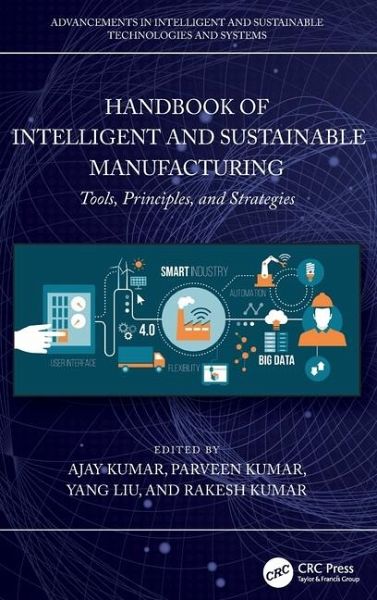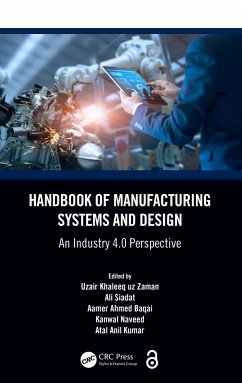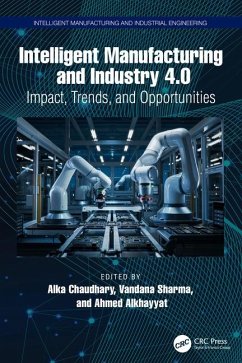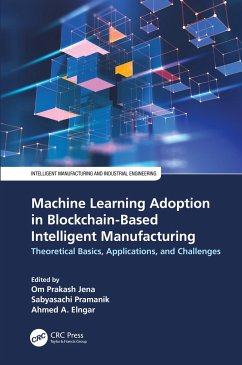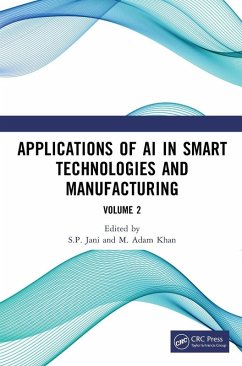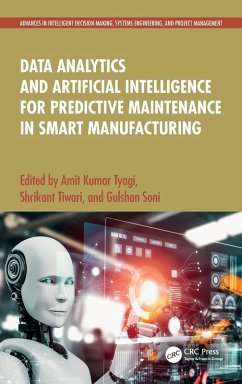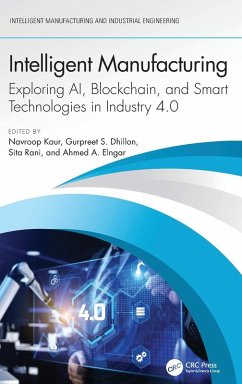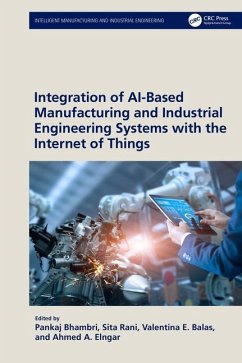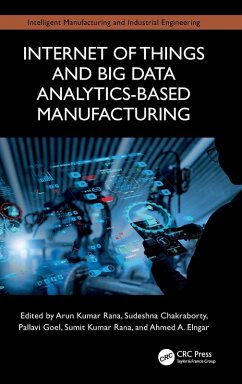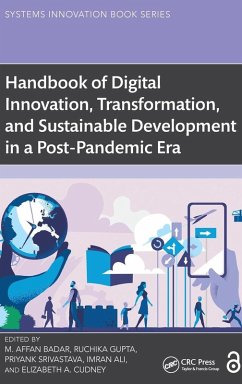Gebundenes Buch
Handbook of Intelligent and Sustainable Manufacturing
Tools, Principles, and Strategies
Herausgeber: Kumar, Ajay; Liu, Yang; Parveen
Versandkostenfrei!
Versandfertig in 1-2 Wochen
Weitere Ausgaben:

PAYBACK Punkte
95 °P sammeln!




Intelligent and sustainable manufacturing employs computer-integrated manufacturing, digital information technology, flexible technical workforce training, and rapid design changes. This handbook provides a compiled knowledge of intelligent and sustainable manufacturing within the context of Industry 4.0.
Prof. (Dr.) Ajay Kumar is currently serving as a Professor in the Department of Mechanical Engineering in the School of Engineering and Technology, JECRC University, Jaipur, Rajasthan, India. He received his Ph.D. in the field of Advanced Manufacturing and Automation from Guru Jambheshwar University of Science & Technology, Hisar, India after B.Tech. (Hons.) in mechanical engineering and M.Tech. (Distinction) in manufacturing and automation. His areas of research include Biomedical Engineering, Incremental Sheet Forming, Artificial Intelligence, Sustainable Materials, Robotics and Automation, Additive Manufacturing, Mechatronics, Smart Manufacturing, Industry 4.0, Industrial Engineering Systems, Waste Management, and Optimization Techniques. Dr. Kumar has over 80 publications in international journals of repute including SCOPUS, Web of Science and SCI indexed database and refereed international conferences. He has organized various national and international events including an international conference on Mechatronics and Artificial Intelligence (ICMAI-2021) as conference chair. He also organized an international conference on Artificial Intelligence, Advanced Materials, and Mechatronics Systems (AIAMMS-2023) as conference chair. He has more than 20 national and international patents to his credit and has supervised more than 8 M. Tech, and Ph. D. scholars and numerous undergraduate projects/thesis. He has a total of 15 years of experience in teaching and research and have been a Guest Editor of many reputed journals. He has contributed to many international conferences/symposiums as a session chair, expert speaker, and member of the editorial board and has won several proficiency awards during his career, including merit awards and best teacher awards. He has also co-authored and co-edited more than 15 books and proceedings and has authored many in-house course notes, lab manuals, monographs, and invited chapters in books. Dr. Kumar has organized a series of Faculty Development Programs, International Conferences, workshops, and seminars for researchers, Ph.D., UG, and PG-level students and is associated with many research, academic, and professional societies in various capacities. Mr. Parveen is currently serving as an Assistant Professor and Head in the Department of Mechanical Engineering at Rawal Institute of Engineering and Technology, Faridabad, Haryana, India. He is pursuing his Ph.D. from National Institute of Technology, Kurukshetra, Haryana, India. He completed his B.Tech. (Hons.) from Kurukshetra University, Kurukshetra, India and M.Tech. (Distinction) in Manufacturing and Automation from Maharshi Dayanand University, Rohtak, India. He has over 20 publications in international journals of repute including SCOPUS, Web of Science and SCI indexed database and refereed international conferences. He has 8 national and international patents to his credit and has supervised more than 10 M.Tech. scholars and numerous undergraduate projects/theses. Dr. Parveen has a total of 12 years of experience in teaching and research and has co-authored/co-edited several books. His areas of research include Intelligent Manufacturing Systems, Materials, Die less Forming, Design of Automotive systems, Additive Manufacturing, CAD/CAM and artificial Intelligence, Machine Learning and Internet of Things in Manufacturing, and Multi Objective Optimization techniques. He has also organized a series of Faculty Development Programmes, workshops, and seminars for researcher, and UG level students. Dr. Yang Liu received an M.Sc. (Tech.) degree in Telecommunication Engineering and D.Sc. (Tech.) degree in Industrial Management from the University of Vaasa, Finland, in 2005 and 2010, respectively. He is currently a tenured Associate Professor and Doctoral Supervisor with the Department of Management and Engineering, Linköping University, Sweden; a Visiting Faculty with the Department of Production, University of Vaasa, Finland; and a Chair Professor with Jinan University, China. Meanwhile, he is an Adjunct/Visiting Professor at multiple other universities. His research interests include sustainable smart manufacturing, product service innovation, decision support system, competitive advantage, control systems, autonomous robots, signal processing, and pattern recognition. Dr. Liu has authored or co-authored more than 130 peer-reviewed scientific articles and is ranked No.1 among the top authors on "big data analytics in manufacturing." His publications have appeared in multiple distinguished journals, and some ranked as top 0.1% ESI Hot Papers and top 1% ESI Highly Cited Papers. Rakesh Kumar is currently serving as the Vice President Operations, Sigma Electric Manufacturing Corporation Pvt Ltd, Sigma Engineered Solutions, Jaipur, Rajasthan, India. He received his Master of Science (MS) in Quality Management from BITS-Pilani, India after B.E from same institute. He is also Six Sigma Black Belt certified from ASQ. He has also worked in multinational companies like Asahi Glass, Bawal, India and Rieter Automotive, India. In current company (Sigma) he is leading operations of five world class manufacturing plants. He has worked on improving human efficiencies, Robotics, advanced machining, Automatic loading and unloading, and human less material transferring. He has a total of 20 years of experience in manufacturing industries. He is members of Indian Institute of Foundry (IFEX) and Confederation of Indian Industries (CII). He has contributed to many conferences as a session chair and expert speaker and has won several proficiency awards during his career, including Operations Excellence awards, best Quality award, and the Zero PPM award. He is an Enterprising Leader with a strong record of contributions in streamlining operations & procedures, invigorating businesses, aiming for senior level assignments in Strategic Planning, Operational Excellence, Plant Operations, Business Management, Stakeholder Management, and Team Management with high repute. His areas of experts are Manufacturing Excellence, Industry 4.0, Waste management, and optimization techniques.
Produktdetails
- Verlag: CRC Press
- Seitenzahl: 358
- Erscheinungstermin: 28. August 2024
- Englisch
- Abmessung: 240mm x 161mm x 24mm
- Gewicht: 702g
- ISBN-13: 9781032519838
- ISBN-10: 1032519835
- Artikelnr.: 70146347
Herstellerkennzeichnung
Libri GmbH
Europaallee 1
36244 Bad Hersfeld
gpsr@libri.de
Für dieses Produkt wurde noch keine Bewertung abgegeben. Wir würden uns sehr freuen, wenn du die erste Bewertung schreibst!
Eine Bewertung schreiben
Eine Bewertung schreiben
Andere Kunden interessierten sich für




